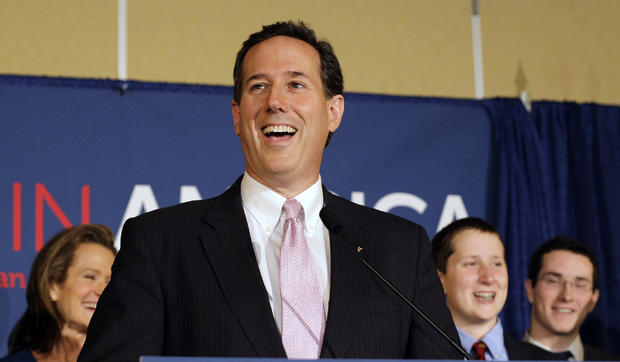Santorum sweeps Mississippi, Alabama primaries
Updated: 4:48 a.m. ET
(CBS News) Republican presidential candidate Rick Santorum has won Tuesday night's primary contests in Alabama and Mississippi.
With almost all of the precincts reporting in Alabama, Santorum earned 35 percent support, with Newt Gingrich barely edging Mitt Romney out for second as each won about 29 percent of the vote.
Meanwhile, in Mississippi, with nearly all of the votes in, Santorum led his rivals with 33 percent support, while Gingrich followed him with 31 percent. Romney came in third with 30 percent.
The Associated Press reported that Romney picked up all nine delegates in the Republican caucus in American Samoa.
The Associated Press reported early Wednesday morning that Romney had won the Republican presidential caucuses in Hawaii, which were also held Tuesday, salvaging a victory after his losses in the far more conservative South. There are 17 delegates up for grabs in Hawaii.
Full Alabama primary results
Full Mississippi primary results
Full Hawaii caucuses results
"We did it again," Santorum exclaimed Tuesday night, in remarks to supporters in Louisiana after the polls closed.
"This is a grassroots campaign for president. Who would have ever thought in the age of media that we have in this country today that ordinary folks from across this country can defy the odds day in, day out?"
The candidate also took a swipe at Romney for allegedly considering himself the "inevitable" GOP nominee.
"For someone who thinks this race is inevitable, he's spending a whole lot of money against me," Santorum said, before calling out "all the establishment" for being "on the other side of this race."
"The time is now for conservatives to pull together," he said. "The time is now to make sure -- to make sure that we have the best chance to win this election, and the best chance to win this election is to nominate a conservative to go up against Barack Obama who can take him on, on every issue."
"We're very excited!" he said. (watch at left)
When asked how he thought the evening's results would change the race, Santorum suggested that the field might soon become more narrow.
"As I've been saying... this adventure's going to be a two person race, and when it does, the conservative will win."
Santorum has not formally called on Gingrich to pull out of the race, but his campaign has made clear that it believes the candidate would benefit greatly from the former House speaker's departure.
Gingrich, speaking to supporters in Alabama, congratulated Santorum on "a great campaign," but did not back down from his pledge to stay in the race through the Republican presidential convention this summer.
"Because this is proportional representation, we are going to leave Mississippi and Alabama with a substantial number of delegates," Gingrich said.
He, too, assailed the concept that Romney is the "inevitable" Republican presidential nominee.
In a statement, Romney, who did not speak publicly after the polls closed, congratulated Santorum for his victories but noted that he was "pleased that we will be increasing our delegate count in a very substantial way after tonight."
"With the delegates won tonight, we are even closer to the nomination. Ann and I would like to thank the people of Alabama and Mississippi. Because of their support, our campaign is on the move and ready to take on President Obama in the fall," the statement read.
Analysis: As Gingrich fades, GOP race becomes two-man fight
Despite losses, Gingrich vows to stay in the race
Because both Alabama and Mississippi allocate their delegates proportionately, Santorum, Gingrich and Romney will all receive delegates as a result of the evening's contests. According to the current CBS News estimate, Santorum netted only 9 more delegates than Romney on Tuesday, despite his back-to-back victories. He earned only 8 more delegates than Gingrich.
According to exit polls out of Alabama, Santorum did particularly well in the state among very conservative voters and women.
He also did well among those in the state who thought it was most important that a candidate have a strong moral character or that he be a true conservative, and those who thought it was very important that they share a candidate's religious beliefs.Overall in Alabama, 80 percent of primary voters identified as born-again or evangelical Christians, according to exit polls. Seventy-five percent of primary voters said they thought it mattered either a great deal or somewhat that a candidate share their religious beliefs.
In Mississippi, 83 percent of voters said they were either born-again or evangelical Christians, according to exit polls; 78 percent said they thought it mattered either a great deal or somewhat that a candidate share their religious beliefs.
How Santorum won the Mississippi primary
How Santorum won the Alabama primary
Alabama exit poll
Mississippi exit poll
In Mississippi and Alabama, Romney was dogged by the notion that he is insufficiently conservative: Fifty percent or more of Alabama and Mississippi primary voters alike said Romney's issue positions are not conservative enough, according to exit polls. More than fifty percent of voters in those states, however, said they thought Gingrich's and Santorum's positions on the issues are "about right."
Polling out of Alabama and Mississippi ahead of Tuesday's contest showed
close contests between Romney, Santorum and Gingrich, although Romney at one point referred to the region as "a bit of an away game" for him. A victory in the
conservative South would have helped Romney demonstrate he has the ability to expand his base, while a win for Gingrich could have helped him demonstrate his
strength in the South.
For Santorum, wins in Alabama and Mississippi could help him prove to supporters that he is the GOP's main alternative to Romney.
With an estimated 450 delegates under his belt so far, Romney remains well ahead of his rivals in the race to the 1,144 delegates needed to secure the nomination. Santorum has around 213, Gingrich 117 and Ron Paul 40, according to CBS News estimates.
